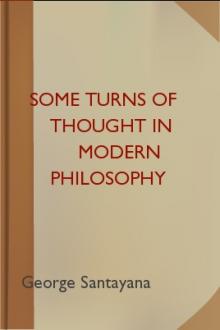Some Turns of Thought in Modern Philosophy, George Santayana [if you liked this book .TXT] 📗

- Author: George Santayana
- Performer: -
Book online «Some Turns of Thought in Modern Philosophy, George Santayana [if you liked this book .TXT] 📗». Author George Santayana
The self which acts in a man is itself moved by forces which have long been familiar to common sense, without being understood except dramatically. These forces are called the passions; or when the dramatic units distinguished are longish strands rather than striking episodes, they are called temperament, character, or will; or perhaps, weaving all these strands and episodes together again into one moral fabric, we call them simply human nature. But in what does this vague human nature reside, and how does it operate on the non-human world? Certainly not within the conscious sphere, or in the superficial miscellany of experience. Immediate experience is the intermittent chaos which human nature, in combination with external circumstances, is invoked to support and to rationalise. Is human nature, then, resident in each individual soul? Certainly: but the soul is merely another name for that active principle which we are looking for, to be the seat of our sensibility and the source of our actions. Is this psychic power, then, resident in the body? Undoubtedly; since it is hereditary and transmitted by a seed, and continually aroused and modified by material agencies.
Since this soul or self in the body is so obscure, the temptation is great to dramatise its energies and to describe them in myths. Myth is the normal means of describing those forces of nature which we cannot measure or understand; if we could understand or measure them we should describe them prosaically and analytically, in what is called science. But nothing is less measurable, or less intelligible to us, in spite of being so near us and familiar, as the life of this carnal instrument, so soft and so violent, which breeds our sensations and precipitates our actions. We see today how the Freudian psychology, just because it is not satisfied with registering the routine of consciousness but endeavours to trace its hidden mechanism and to unravel its physical causes, is driven to use the most frankly mythological language. The physiological processes concerned, though presupposed, are not on the scale of human perception and not traceable in detail; and the moral action, though familiar in snatches, has to be patched by invented episodes, and largely attributed to daemonic personages that never come on the stage.
Locke, in his psychology of morals, had at first followed the verbal rationalism by which people attribute motives to themselves and to one another. Human actions were explained by the alleged pursuit of the greater prospective pleasure, and avoidance of the greater prospective pain. But this way of talking, though not so poetical as Freud's, is no less mythical. Eventual goods and evils have no present existence and no power: they cannot even be discerned prophetically, save by the vaguest fancy, entirely based on the present impulses and obsessions of the soul. No future good, no future evil avails to move us, except—as Locke said after examining the facts more closely—when a certain uneasiness in the soul (or in the body) causes us to turn to those untried goods and evils with a present and living interest. This actual uneasiness, with the dream pictures which it evokes, is a mere symptom of the direction in which human nature in us is already moving, or already disposed to move. Without this prior physical impulse, heaven may beckon and hell may yawn without causing the least variation in conduct. As in religious conversion all is due to the call of grace, so in ordinary action all is due to the ripening of natural impulses and powers within the psyche. The uneasiness observed by Locke is merely the consciousness of this ripening, before the field of relevant action has been clearly discerned.
When all this is considered, the ostensible interaction between mind and body puts on a new aspect. There are no purely mental ideas or intentions followed by material effects: there are no material events followed by a purely mental sensation or idea. Mental events are always elements in total natural events containing material elements also: material elements form the organ, the stimulus, and probably also the object for those mental sensations or ideas. Moreover, the physical strand alone is found to be continuous and traceable; the conscious strand, the sequence of mental events, flares up and dies down daily, if not hourly; and the medley of its immediate features—images, words, moods—juxtaposes China and Peru, past and future, in the most irresponsible confusion. On the other hand, in human life it is a part of the conscious element—intentions, affections, plans, and reasonings—that explains the course of action: dispersed temporally, our dominant thoughts contain the reason for our continuous behaviour, and seem to guide it. They are not so much links in a chain of minute consecutive causes—an idea or an act of will often takes time to work and works, as it were, only posthumously—as they are general overarching moral inspirations and resolves, which the machinery of our bodies executes in its own way, often rendering our thoughts more precise in the process, or totally transforming them. We do roughly what we meant to do, barring accidents. The reasons lie deep in our compound nature, being probably inarticulate; and our action in a fragmentary way betrays our moral disposition: betrays it in both senses of the word betray, now revealing it unawares, and now sadly disappointing it.
I leave it for the reader's reflection to decide whether we should call such cohabitation of mind with body interaction, or not rather sympathetic concomitance, self-annotation, and a partial prophetic awakening to a life which we are leading automatically.
VII Page 21. To the confusion of common sense.Berkeley and his followers sometimes maintain that common sense is on their side, that they have simply analysed the fact of our experience of the material world, and if there is any paradox in their idealism, it is merely verbal and disappears with familiarity. All the "reality", they say, all the force, obduracy, and fertility of nature subsist undiminished after we discover that this reality resides, and can only reside, in the fixed order of our experience.
But no: analysis of immediate experience will never disclose any fixed order in it; the surface of experience, when not interpreted materialistically, is an inextricable dream. Berkeley and his followers, when they look in this direction, towards nature and the rationale of experience and science, are looking away from their own system, and relying instead on the automatic propensity of human nature to routine, so that we spontaneously prepare for repeating our actions (not our experience) and even anticipate their occasions; a propensity further biased by the dominant rhythms of the psyche, so that we assume a future not so much similar to the past, as better. When developed, this propensity turns into trust in natural or divine laws; but it is contrary to common sense to expect such laws to operate apart from matter and from the material continuity of external occasions. This appears clearly in our trust in persons—a radical animal propensity—which is consonant with common sense when these persons are living bodies, but becomes superstitious, or at least highly speculative, when these persons are disembodied spirits.
It is a pity that the beautiful system of Berkeley should have appeared in an unspiritual age, when religion was mundane and perfunctory, and the free spirit, where it stirred, was romantic and wilful. For that system was essentially religious: it put the spirit face to face with God, everywhere, always, and in everything it turned experience into a divine language for the monition and expression of the inner man. Such an instrument, in spiritual hands, might have served to dispel all natural illusions and affections, and to disinfect the spirit of worldliness and egotism. But Berkeley and his followers had no such thought. All they wished was to substitute a social for a material world, precisely because a merely social world might make worldly interests loom larger and might induce mankind, against the evidence of their senses and the still small voice in their hearts, to live as if their worldly interests were absolute and must needs dominate the spirit.
Morally this system thus came to sanction a human servitude to material things such as ancient materialists' would have scorned; and theoretically the system did not escape the dogmatic commitments of common sense against which it protested. For far from withdrawing into the depths of the private spirit, it professed to describe universal experience and the evolution of all human ideas. This notion of "experience" originally presupposed a natural agent or subject to endure that experience, and to profit by it, by learning to live in better harmony with external circumstances. Each agent or subject of experience might, at other times, become an object of experience also: for they all formed part of a material world, which they might envisage in common in their perceptions. Now the criticism which repudiates this common material medium, like all criticism or doubt, is secondary and partial: it continues to operate with all the assumptions of common sense, save the one which it is expressly criticising. So, in repudiating the material world, this philosophy retains the notion of various agents or subjects gathering experience; and we are not expected to doubt that there are just as many streams of experience without a world, as there were people in the world when the world existed. But the number and nature of these experiences have now become undiscoverable, the material persons having been removed who formerly were so placed as to gather easily imagined experiences, and to be able to communicate them; and the very notion of experience has been emptied of its meaning, when no external common world subsists to impose that same experience on everybody. It was not knowledge of existing experiences in vacuo that led common sense to assume a material world, but knowledge of an existing material world led it to assume existing, and regularly reproducible, experiences.
Thus the whole social convention posited by empirical idealism is borrowed without leave, and rests on the belief in nature for which it is substituted.
VIII Page 21. The literary psychologist may come very near to the truth of experience.Experience cannot be in itself an object of science, because it is essentially invisible, immeasurable, fugitive, and private; and although it may be shared or repeated, the evidence for that repetition or that unanimity cannot be found by comparing a present experience with another experience by hypothesis absent. Both the absent experience and its agreement with the present experience must be imagined freely and credited instinctively, in view of the known circumstances in which the absent experience is conceived to have occurred. The only instrument for conceiving experience at large is accordingly private imagination; and such imagination cannot be tested, although it may be guided and perhaps recast by fresh observations or reports concerning the action and language of other people. For action and language, being contagious, and being the material counterpart of experience in each of us, may voluntarily or involuntarily suggest our respective experience to one another, by causing each to re-enact more or less accurately within himself the experience of the rest. Thus alien thoughts and feelings are revealed or suggested to us in common life, not without a subjective transformation increasing, so to speak, as the square of the distance: and even the record





Comments (0)